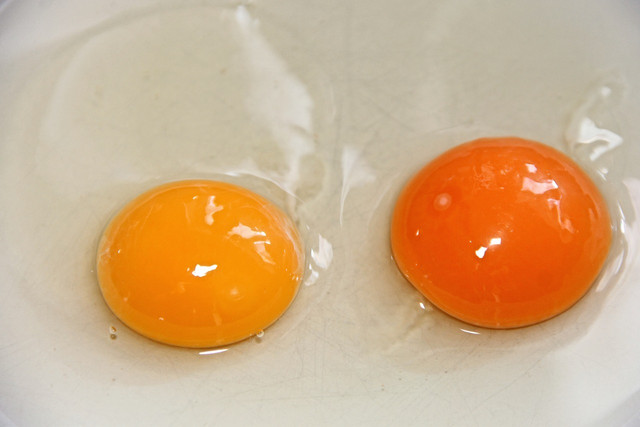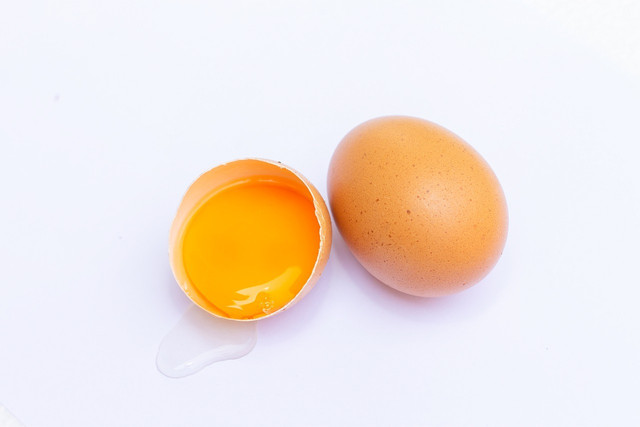Loaded with protein, healthy fats, antioxidants, vitamins, and minerals, eggs are a healthy way to start the day. However, eating raw eggs comes with both benefits and risks.
There are a variety of opinions surrounding eating raw eggs. Fitness fanatics may argue it’s the best way to get ripped quick, others swear eating raw eggs will send you straight to the hospital, and parents often advise children not to eat cookie dough because of salmonella concerns. However, eating raw eggs has some benefits, and if you are careful to purchase and consume them correctly, you can eat raw eggs with confidence.
Benefits of Eating Raw Eggs: They are Nutritious

Eating raw eggs has at least as many benefits as eating cooked ones. The USDA reports one large raw egg contains about 6 grams of protein, 5 grams of fat and 70 calories, whereas one large cooked/fried egg contains 6 grams of protein, 7 grams of fat, and 90 calories. Raw eggs also contain a lot of other nutrients as well, including:
- Magnesium, which are good for heart and brain health.
- Vitamin D which is necessary for your bone health and immune systems.
- Zinc which is important for your nervous system and immune system.
- Cartenoid antioxidants, which crucial to eye health.
- Choline is a nutrient that is said to help maintain memory.
Most of these nutrients are located in the yolk, the egg white consists mostly of proteins.
Downsides of Eating Raw Eggs



While there are benefits of eating raw eggs, there are also risks. The biggest downside to eating raw eggs is the risk of consuming bacteria. Thoroughly cooking or frying them destroys bacteria, making them safe to consume.
About 1 in 20,000 eggs has salmonella bacteria. If you get infected, you may experience symptoms like diarrhea, fever, abdominal cramps. Headaches, nausea and vomiting are also signs of an infection. Other bacteria like Listeria and Campylobacter, are also of concern in raw eggs.
Salmonella infection is riskier for certain groups of people, for example:
- young children
- elderly
- people with a weekend immune system
Some research suggests that eating raw eggs can hinder both protein and biotin absorption. This may be a concern if you are relying on eggs as your main source of protein. However, there are plenty of other plant protein sources to supplement with.
If you have any concerns about eating raw eggs, consult a healthcare professional.
How to Reduce Risk in Eating Raw Eggs



We recommend purchasing organic eggs from free-range, pastured hens. If you buy eggs with the USDA organic label, for example, these hens are fed organically produced feed, administering drugs without the animal being sick is prohibited. Studies suggest that these chickens may be less prone to salmonella – though there are other studies that disagree. All in all, living conditions of chickens in modern farms (even with a organic certification) may often still be far from ideal. So buying less eggs and trying to incorporate more plant-based food into your diet is always a good idea.
When you purchase your eggs, make sure they are refrigerated and pasteurized. Check for the expiration date, and that the eggs are clean and undamaged.
Before consuming, wash your eggs in warm, soapy water to get rid of bacteria. Make sure to wash your hands as well. Rinse the egg off, then crack it open, and check to see that there is no blood in it. It should be fresh, and free of unusual odors.
Read More:
- How Long Do Farm Fresh Eggs Last? And How Can You Tell?
- Vegan Protein Powder: We Review Three Sustainable Brands
- Vegan Egg Substitute: 6 Ideas for Vegan Egg Replacers
Important Information regarding Health-related Topics.
** Links to retailers marked with ** or underlined orange are partially partner links: If you buy here, you actively support Utopia.org, because we will receive a small part of the sales proceeds. More info.Do you like this post?








